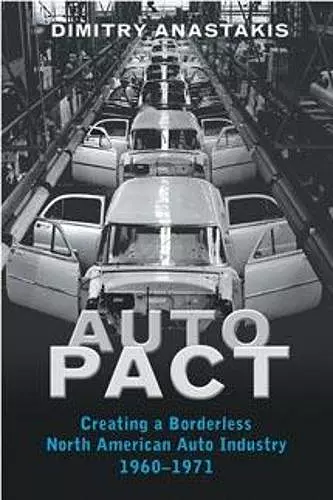Auto Pact
Creating a Borderless North American Auto Industry, 1960-1971
Format:Paperback
Publisher:University of Toronto Press
Published:26th Nov '05
Currently unavailable, and unfortunately no date known when it will be back

'There is no book that even approaches what Dimitry Anastakis has written. Auto Pact is the only detailed, archival-based study of the deal. The scholarship is sound and the research is very impressive. It is well written and addresses a critical Canadian industry.' -- Maureen Appel Molot, Norman Paterson School of International Affairs, Carleton University 'At a time when Canada's most important industry faces unprecedented challenges stemming from unregulated global trade, the arrival of Dimitry Anastakis's Auto Pact could not be more timely. A fascinating exploration of the forces that led to what was arguably Canada's smartest government policy, Auto Pact reminds us of a time when governments acted forcefully to develop Canadian industry. Today's leaders would be well-advised to reflect on the success of the deal - a model of fair trade and industrial development. This book is a must-read for anyone interested in the history of Canada's auto industry, or those concerned with its future.' -- Buzz Hargrove, President, Canadian Auto Workers
Anastakis provides a fresh and alternative view of the auto pact that places it firmly within contemporary debates about the nature of free trade as well as North American - and, indeed, global - integration. Far from being a mere artefact of history, the deal was a forebearer to what is now known as 'globalization.'
The 1965 Canada-United States Automotive Trade agreement fundamentally reshaped relations between the automotive business and the state in both countries and represented a significant step toward the creation of an integrated North American economy. Breaking from previous conceptions of the agreement as solely a product of intergovernmental negotiation, Dimitry Anastakis's Auto Pact argues that the 'big three' auto companies played a pivotal role - and benefited immensely - in the creation and implementation of this new automotive regime. With the border effectively erased by the agreement, the pact transformed these giant enterprises into truly global corporations.
Drawing from newly released archival sources, Anastakis demonstrates that, for Canada's automotive policy makers, continentalism was a form of economic nationalism. Although the deal represented the end of any notion of an indigenous Canadian automotive industry, significant economic gains were achieved for Canadians under the agreement. Anastakis provides a fresh and alternative view of the auto pact that places it firmly within contemporary debates about the nature of free trade as well as North American - and, indeed, global - integration. Far from being a mere artefact of history, the deal was a forebearer to what is now known as 'globalization.'
There is no book that even approaches what Dimitry Anastakis has written. Auto Pact is the only detailed, archival-based study of the deal. The scholarship is sound and the research is very impressive. It is well written and addresses a critical Canadian industry.' Maureen Appel Molot, Norman Paterson School of International Affairs, Carleton University
- Winner of J.J. Talman Award - Ontario Historical Society 2008 (Canada)
ISBN: 9780802038210
Dimensions: 229mm x 152mm x 20mm
Weight: 520g
240 pages